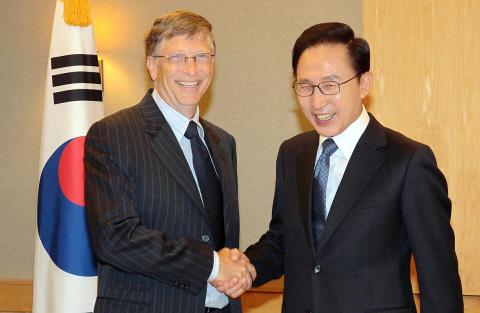Microsoft founder Bill Gates on Friday backed a controversial financial transactions tax to aid development in poor countries, but France acknowledged that most G20 countries did not like the idea.
The Gates Foundation was tasked by French President Nicolas Sarkozy to examine ways the Group of 20 leading economies could raise new money for the world’s poor, including plugging an estimated US$80 billion to US$100 billion funding gap to tackle climate change.
In a report presented to a meeting of G20 ministers in Washington on Friday, the billionaire philanthropist proposed taxing financial transactions, tobacco, and shipping and aviation fuels, according to details of the report obtained by Reuters.

Photo: EPA
With Western donors in Europe and the US under pressure to cut their budgets, and a eurozone sovereign debt crisis escalating, developing nations are desperately seeking new ways to lift themselves out of poverty.
Gates’ point, according to a draft technical note on the report, is that if African countries maintain current average growth rates, their economies will double by early next decade and GDP per capita will rise by more than 50 percent.
The Gates’ report said a financial transaction tax could raise “substantial resources” for developing countries. By some estimates a financial transition tax could generate as much as US$250 billion if derivatives contracts were included.
However, the report suggests even a small tax of 10 basis points on equities and 2 basis points on bonds could bring in about US$48 billion from G20 member states, or US$9 billion if only adopted by larger European countries.
The levy, commonly dubbed a “Tobin tax” after the US economist who proposed the idea in the 1970s, has been mooted at regular intervals to raise funds, but has always struggled to get off the drawing board because it is easy to avoid unless all countries impose it.
“Tonight nobody can say that such a tax on financial transactions is not technically feasible,” French Finance Minister Francois Baroin told a news conference after a G20 meeting on development issues.
“We are making progress on the technical coherence of this project,” he added.
The report will be presented to a G20 leaders’ summit in Cannes, France, in early November.
Countries such as Canada, Britain, the US, Australia and China oppose the tax because it puts more burden on banks, while France, Germany, Austria, Belgium, Norway and Spain support it, along with several African states.
“We are not oblivious to the debate and the doubts about this,” said Baroin, adding that France and Germany were determined to push ahead with the tax despite opposition.
“We have the intention to implement this tax,” he said.

Intel Corp chief executive officer Lip-Bu Tan (陳立武) is expected to meet with Taiwanese suppliers next month in conjunction with the opening of the Computex Taipei trade show, supply chain sources said on Monday. The visit, the first for Tan to Taiwan since assuming his new post last month, would be aimed at enhancing Intel’s ties with suppliers in Taiwan as he attempts to help turn around the struggling US chipmaker, the sources said. Tan is to hold a banquet to celebrate Intel’s 40-year presence in Taiwan before Computex opens on May 20 and invite dozens of Taiwanese suppliers to exchange views

Application-specific integrated circuit designer Faraday Technology Corp (智原) yesterday said that although revenue this quarter would decline 30 percent from last quarter, it retained its full-year forecast of revenue growth of 100 percent. The company attributed the quarterly drop to a slowdown in customers’ production of chips using Faraday’s advanced packaging technology. The company is still confident about its revenue growth this year, given its strong “design-win” — or the projects it won to help customers design their chips, Faraday president Steve Wang (王國雍) told an online earnings conference. “The design-win this year is better than we expected. We believe we will win

Chizuko Kimura has become the first female sushi chef in the world to win a Michelin star, fulfilling a promise she made to her dying husband to continue his legacy. The 54-year-old Japanese chef regained the Michelin star her late husband, Shunei Kimura, won three years ago for their Sushi Shunei restaurant in Paris. For Shunei Kimura, the star was a dream come true. However, the joy was short-lived. He died from cancer just three months later in June 2022. He was 65. The following year, the restaurant in the heart of Montmartre lost its star rating. Chizuko Kimura insisted that the new star is still down

While China’s leaders use their economic and political might to fight US President Donald Trump’s trade war “to the end,” its army of social media soldiers are embarking on a more humorous campaign online. Trump’s tariff blitz has seen Washington and Beijing impose eye-watering duties on imports from the other, fanning a standoff between the economic superpowers that has sparked global recession fears and sent markets into a tailspin. Trump says his policy is a response to years of being “ripped off” by other countries and aims to bring manufacturing to the US, forcing companies to employ US workers. However, China’s online warriors